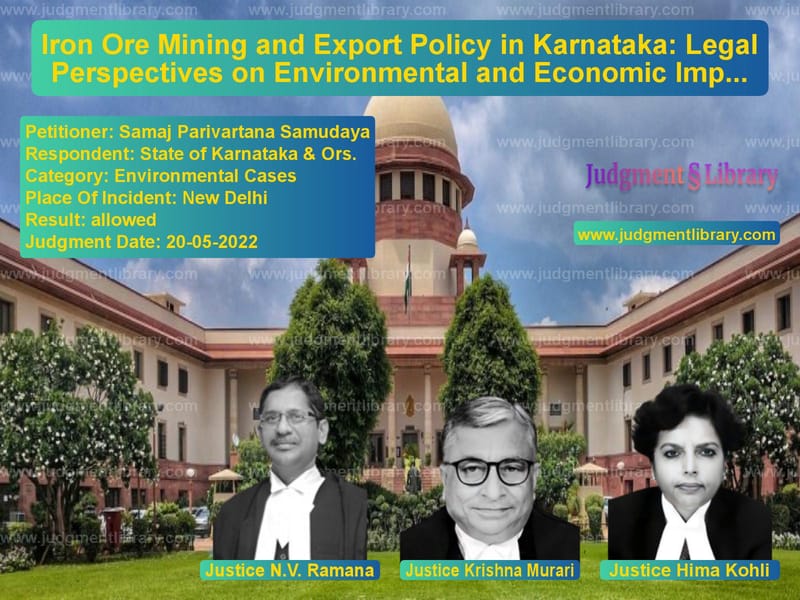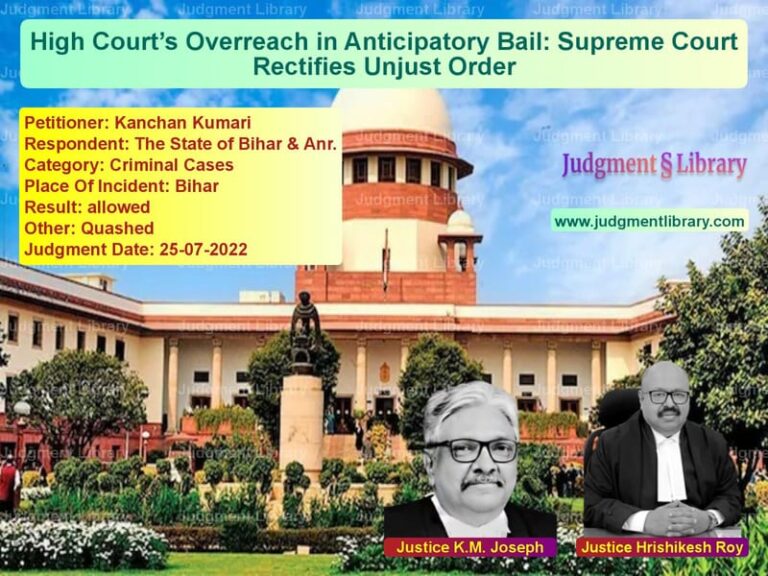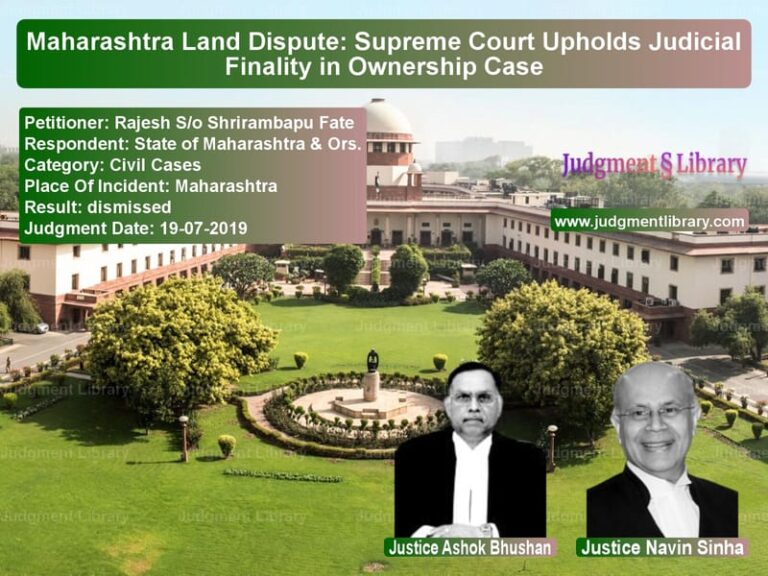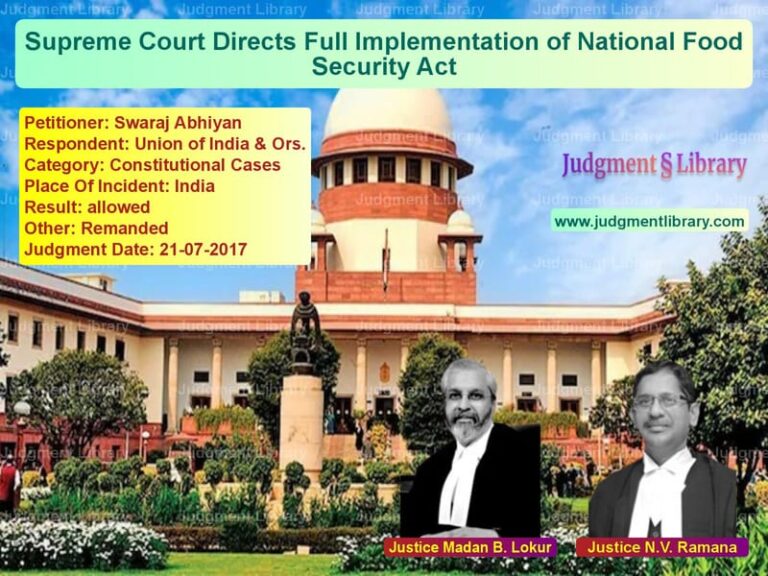Iron Ore Mining and Export Policy in Karnataka: Legal Perspectives on Environmental and Economic Implications
This case revolves around the writ petition filed under Article 32 of the Constitution of India, seeking directions for halting illegal mining activities and to regulate the mining process in Karnataka, particularly in the Bellary, Chitradurga, and Tumkur districts. The petitioner, Samaj Parivartana Samudaya, requested that the State of Karnataka, Andhra Pradesh, and the Union of India stop mining activities being carried out in violation of earlier court orders, specifically the order of 12th December 1996, passed in T.N. Godavarman Thirumulpad v. Union of India. The petition also sought the declaration of mining contracts issued in violation of the Mines and Minerals (Development and Regulation) Act, 1957 as illegal and for the stoppage of mining activities within the Bellary Reserve Forest.
Petitioner’s Arguments
The petitioner argued that indiscriminate mining was carried out in the forest areas of Karnataka, particularly in the Bellary district, despite an earlier ruling by this Court in 1996. They contended that illegal mining had caused significant environmental degradation, leading to the depletion of forest resources and the destruction of wildlife habitats. The petitioner also pointed out that despite the orders of this Court, mining activities continued unabated, and the government failed to enforce proper regulations to curb the illegal mining activities. The petitioner requested that all mining operations be immediately halted, and any mining leases or sub-leases issued in violation of the Mines and Minerals (Development and Regulation) Act, 1957 be declared null and void.
The petitioner also sought the annulment of notifications dated 15th March 2003 and other related notifications that dereserved lands for mining operations. These notifications, the petitioner argued, were issued in contravention of the Forest (Conservation) Act, 1980 and violated the principles of sustainable development. The petitioner further contended that the government had failed to implement recommendations made by the Central Empowered Committee (CEC) regarding the regulation of mining activities and environmental protection.
Respondent’s Arguments
The respondents, represented by counsel for the State of Karnataka, argued that the mining activities being carried out in the region were in compliance with the law and that the environmental degradation was not as severe as the petitioner suggested. The State emphasized that various steps had been taken to monitor and regulate mining activities, including the constitution of a joint team to conduct surveys of the affected areas. The respondents also pointed out that the government had already implemented several measures to address the environmental impact of mining, including the preparation of Reclamation and Rehabilitation Plans (R&R Plans) for the affected areas.
The respondents further argued that the restrictions imposed by the Court had caused a disruption in the mining industry, leading to financial losses for mining companies. They contended that the lifting of the mining ban in certain areas, after compliance with the prescribed conditions, was necessary to revitalize the industry and ensure that the country’s iron ore requirements were met. The respondents also emphasized that they had made significant improvements in the mining infrastructure and the regulatory framework, which they claimed had led to better environmental management in the region.
Court’s Analysis and Conclusion
The Supreme Court considered the arguments presented by both parties and reviewed the reports submitted by the Central Empowered Committee (CEC). The Court acknowledged that illegal mining had taken place in the Bellary district and that it had caused significant environmental damage. However, the Court also recognized that substantial efforts had been made by the State to address these issues and implement corrective measures. The Court noted that the CEC had recommended the reopening of certain mines under strict conditions, including the implementation of R&R plans and the adherence to annual production limits.
The Court also considered the request for the lifting of the ban on the export of iron ore from the region and the discontinuation of the e-auction process for the sale of iron ore. The Court pointed out that while the e-auction system had been implemented to ensure transparency and fair pricing, it had not been as successful as expected. The Court agreed with the CEC’s recommendation to allow the sale of unsold iron ore stock without the e-auction process, as long as the appropriate safeguards were put in place. The Court emphasized that the lifting of the export ban and the changes to the e-auction system should be made in accordance with the government’s policy and environmental guidelines.
Final Decision
The Supreme Court ruled in favor of the respondents to some extent by allowing the lifting of the ban on the export of iron ore from the districts of Bellary, Chitradurga, and Tumkur, subject to adherence to the policy of the Government of India. The Court also allowed the sale of the iron ore stockpile through direct contracts, instead of through the e-auction system, provided that all appropriate environmental safeguards were maintained. The Court directed that the state-level caps on iron ore production be reviewed and possibly lifted, but deferred a decision on this issue until further reports from the Oversight Authority were received. The Court also emphasized that the existing restrictions on mining should be gradually relaxed as long as the environmental impact was managed properly and the industry operated in compliance with the necessary legal requirements.
Petitioner Name: Samaj Parivartana Samudaya.Respondent Name: State of Karnataka & Ors..Judgment By: Justice N.V. Ramana, Justice Krishna Murari, Justice Hima Kohli.Place Of Incident: New Delhi.Judgment Date: 20-05-2022.
Don’t miss out on the full details! Download the complete judgment in PDF format below and gain valuable insights instantly!
Download Judgment: samaj-parivartana-sa-vs-state-of-karnataka-&-supreme-court-of-india-judgment-dated-20-05-2022.pdf
Directly Download Judgment: Directly download this Judgment
See all petitions in Environmental Cases
See all petitions in Contract Disputes
See all petitions in Landlord-Tenant Disputes
See all petitions in Judgment by N.V. Ramana
See all petitions in Judgment by Krishna Murari
See all petitions in Judgment by Hima Kohli
See all petitions in allowed
See all petitions in supreme court of India judgments May 2022
See all petitions in 2022 judgments
See all posts in Environmental Cases Category
See all allowed petitions in Environmental Cases Category
See all Dismissed petitions in Environmental Cases Category
See all partially allowed petitions in Environmental Cases Category







